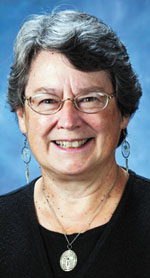By Corinne Winter

“The Second Vatican Council enabled the light of faith to illumine our human experience from within [and] showed how faith enriches life in all its dimensions.” (Pope Francis, Lumen Fidei para 6)
For over a year, I have been using this column to reflect on the “Year of Faith” declared by Pope Benedict in honor of the 50th anniversary of the Second Vatican Council. I want to close the series by reflecting on the richness of the Catholic Faith Tradition as an integrated and integrating approach to life in general. In a short article, I will not be able to do full justice to the topic, of course, but I hope to offer a few seeds for further reflection.
Catholic Tradition presents faith as a rich multi-faceted response to God’s self-revelation in Jesus Christ. It includes assent to doctrine, reflection on its implications for the way we ought to live, service to others, efforts to promote justice and peace, prayer, and liturgy and cannot be reduced to any one or to several of its aspects.
Assent to the teachings of the Church is, of course, vital to Catholic faith. Thomas Aquinas says that the knowledge of certain truths is essential to our search for the ultimate Truth who is God. But that assent must also be reflective. Recently the students in my introductory level course have been studying the Doctrine of the Trinity. As we began I asked them about their current thought on the Trinity. One student seemed to speak for many as she sighed, “It’s just a mystery.” Further conversation revealed some temptation on the part of students to use the “mystery” label as an excuse to give it a nod and then to park it in a dark corner of their minds where it would not bother them too much. But that kind of acceptance isn’t faith at all; it is fideism. By contrast, an upper-level student said of the doctrine, “Oh, that still blows my mind!” She takes the doctrine as a starting point for reflection – for engagement with the God who is revealed. To suggest either that doctrine is unimportant for faith and spirituality or that it is something to be taken in without further reflection is to impoverish our faith tradition.
Service and work for justice, especially on behalf of those most in need is also an essential part of a life of faith. Catholic Social Teaching, including Gaudium et Spes and other documents from the Council, demonstrate clearly that we are called to respect the dignity of all persons and their right to be able to meet their basic needs. At the same time, we can not reduce the Catholic Tradition to service and work for justice. Many people, including some who explicitly reject religious faith of any kind, will be working alongside of us in those endeavors; the difference our faith tradition makes will be in the motivation for and the way we integrate the experience into our lives. That takes reflection and prayer as well.
Prayer and the spiritual life center our lives in relation to the Transcendent. To say that we cannot live a life of faith without prayer sounds redundant. But in the business of this world, we may be tempted to reduce prayer to prayers — to recitations and practices that can be counted and checked off a list. Catholic Spiritual Tradition calls for a cycle of prayer that marks the presence of God within and throughout the day. When I was attending a Catholic grade school, we were encouraged to dedicate each assignment to God and to take time every hour for a short prayer-sentence. If we fail to pursue a spirituality that integrates all we do, we impoverish both our prayer and our work.
The Constitution on the Sacred Liturgy, the first document promulgated by the Council, (the 50th anniversary of which will be celebrated in December), calls the Eucharist the “source and summit” of the work of the Church. In the Eucharist, we stand as a community of faith in the presence of the central mystery of that faith – the Paschal Mystery. We are nourished, encouraged, and challenged by the story of God’s work among us. As we conclude our celebration of the Year of Faith and approach another year of faith, may we continue to be energized through our eucharistic gatherings.
(Corinne Winter is a professor of theology at St. Ambrose University in Davenport.)







